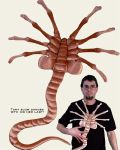You know, much as I’d like to get excited about the prospect of a Bloom County feature film, given Disney‘s track record over the past few years (nearly anything without Pixar‘s involvement is a waste of time — Pirates of the Caribbean and Lilo and Stitch are the only exceptions I can think of, and even Lilo, while enjoyable, isn’t quite up to the standards Disney used to have), the news that their first foray into 3-D animation without Pixar’s involvement will be a Bloom County film doesn’t thrill me.
Miramax Films will co-finance and distribute computer-animated family films starting with “Opus,” adapted from the popular “Bloom County” comic strip, the company said Thursday.
Miramax will release some of the films under its Dimension banner and produce them in conjunction with Wild Brain Inc., a San Francisco-based animated film company perhaps best known for creating the nasty toe fungus in commercials for the prescription drug Lamisil.
Now, while I don’t know anything about Wild Brain (or their nasty toe fungus), the fact that the movie will be under the Disney subsidiary Miramax does give some hope that the end result won’t be as Disney-fied as might otherwise be the case (after all, Miramax does distribute a lot of movies I enjoy, including many of Kevin Smith‘s works). So maybe it won’t be all bad, right? But then the article goes on…
The deal envisions lower budget feature films consistent with Miramax’s independent studio status. Films will cost about half of the bigger budget movies produced by Pixar Animation Studios or DreamWorks SKG.
“What you spend doesn’t necessarily reflect on how good the movie is,” said Jim Miller, Wild Brain chairman.
Well, sure Jim, that’s quite true — there are many, many examples of low-budget films whose quality far outshines the big-budget extravaganzas foisted upon us by the movie studios each summer. However, that said, “low-budget” isn’t really a term I tend to associate with CGI. Still, I will easily admit that I know jack squat about the costs involved in CGI. Maybe it is possible to create a quality feature length CGI film on 1/2 the budget of a Pixar film (though given how good Pixar’s films are, and how successful, I’d hesitate to consider calling their work too expensive).
I’m also having a little difficulty trying to envision the Bloom County universe as a fully three-dimensional rendered world. I keep trying to picture Opus, Bill, and the rest of the critters as 3-D models, and stumbling. On top of that, there are the human characters — Milo, Binkley, Steve, Cutter John, Oliver — and human animation is getting better, but will it be good enough to actually realize the characters I’ve grown up with?
But beyond the quality of the animation and the talent of the animators, there’s this little thing called the script that someone’s got to worry about, and when dealing with a property as well-known and loved as Bloom County, that’s got to be very important consideration.
The choice of subject for the first film reflects Miramax’s eclectic tastes and could prove to be a hard sell, especially to younger audiences.
The character of Opus is a rotund penguin with a cynical world view – far from the heartwarming characters at the center of such films as “Finding Nemo.”
“We agree that it’s a challenge,” Miller said. “How do you take the essence of those characters, who are a little cynical, and move them into a story that can reach adults at the ‘Bloom County’ level and children at their level? We think we have a terrific story.”
The challenge has been given to screenwriter Craig Mazin, whose credits include “Scary Movie 3.” “Bloom County” is written by Berkeley Breathed.
And therein lies my real fear.
So far, I’ve only ever seen two properties that I ever felt could really bridge the gap between children’s entertainment and adult entertainment in a way that successfully appealed to both age groups without pandering to either: The Muppets (with the original television show and the first movie being the high points) and Animaniacs. All too often, either something ends up being watered down too much in order to aim at the children, and the adults have to sit through mind-numbingly asinine shows to appease their children, or the humor is aimed so much at the adult level that parents aren’t comfortable allowing younger children to watch.
Combining the two is a very tricky business, often requiring a level of subtlety that I just don’t see much these days. Rather than going for obvious “adult” or “juvenile” humor (which, admittedly, these days seems all too similar, usually revolving around toilet humor, with the only real difference being whether or not there’s a sexual overtone), it seems to require more thought to the humor — more intelligent jokes, more puns, veiled references…done well (as both the Muppets and Animaniacs did), it can be incredibly enjoyable for both age groups. Done poorly, and nobody enjoys it as much as they should.
Of course, as with all things, there will be no real way to know until it comes out, which should be sometime in 2006. Until then, though…well, I won’t be holding my breath. And if all else fails, there is a lot of Bloom County in print that is just as funny to me now as it was when it came out (sometimes funnier, as I’ve grown older and more able to understand some of the humor).
 “Attached” by Orbital from the album Snivilisation (1994, 12:25).
“Attached” by Orbital from the album Snivilisation (1994, 12:25).

